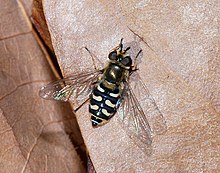Scaeva pyrastri
| Scaeva pyrastri | |
|---|---|
 |
|
| Male | |
 |
|
| Female | |
| Scientific classification | |
| Kingdom: | Animalia |
| Phylum: | Arthropoda |
| Class: | Insecta |
| Order: | Diptera |
| Family: | Syrphidae |
| Genus: | Scaeva |
| Species: | S. pyrastri |
| Binomial name | |
|
Scaeva pyrastri (Linnaeus, 1758) |
|
| Synonyms | |
Scaeva pyrastri, common name the pied hoverfly, is a species of hoverfly.
These hoverflies are present in most of Europe, in the Near East, in the East Palearctic ecozone, in Nearctic ecozone, in North Africa and in the Oriental ecozone.
Scaeva pyrastri can reach a length of 11–15 millimetres (0.43–0.59 in). This large distinctive fly has three pairs of white comma markings (lunules) on the abdomen, these are yellow on Scaeva selenitica.
The face is yellow, with reddish brown antennae. The eyes are covered with hair. Scutellum is brown yellow. The legs are red with a black base of the femur. The male's eyes do touch in the centre of the frons, while in the females they are separated.
The larvae are light green or sometimes pink, with a white dorsal longitudinal stripe.
This species can be found in gardens, meadows and wasteland. Adults are common visitors to flowers of Apiaceae (Umbelliferae), but also of rape, honeysuckle and daisies. They fly from April to September, with the peak in July and August. The larvae feed on different aphid species. During the larval stages they may consume over 500 aphids.
...
Wikipedia
